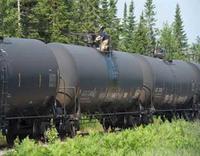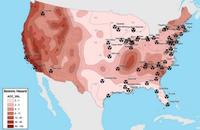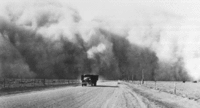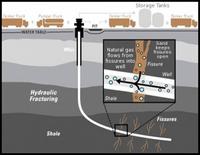-
Abundant shale gas, by itself, not likely to alter climate projections
While natural gas can reduce greenhouse emissions when it is substituted for higher-emission energy sources, abundant shale gas is not likely substantially to alter total emissions without policies targeted at greenhouse gas reduction, a new study finds. If natural gas is abundant and less expensive, it will encourage greater natural gas consumption and less of fuels such as coal, renewables and nuclear power. The net effect on the climate will depend on whether the greenhouse emissions from natural gas — including carbon dioxide and methane — are lower or higher than emissions avoided by reducing the use of those other energy sources.
-
-
Absorbent used in kitty litter may be cause of radiation leaks in U.S. nuke dump
A wheat-based absorbent often used in kitty litter may be the likely cause of the radiation leak that led to the closure of the Waste Isolation Pilot Plant(WIPP), the U.S. only underground nuclear waste repository, according to Jim Conca, a former geochemist at Los Alamos National Laboratory(LANL). Conca noted that EnergySolutions, a Salt Lake City-based company hired to package radioactive waste at LANL into containers for shipment to the WIPP, switched from using a clay-based absorbent in the storage drums to a wheat-based mixture.
-
-
U.S. to require railroads to notify states when oil is shipped

With the increase in available oil from fracking and larger pipeline capacity, railways are moving more and more oil. Rail companies moved 400,000 oil carloads in 2013, dwarfing 2005’s 6,000 oil carloads. The increase in oil shipments of oil has led to an increase in the number of accidents involving oil tankers. In the wake of recent accidents, the U.S. Department of Transportation (DOT) has released an emergency order to railroad companies which is designed to reduce the risk when shipping crude oil across the nation.
-
-
Lawmakers want safer waste storage at nuclear plants
Lawmakers on Tuesday introduced a set of bills aimed at improving the safety and security of nuclear power plants’ waste in the event of a natural disaster or terrorism. One of the bills would require nuclear power plant operators to accelerate the transfer of nuclear waste stored in spent fuel pools into dry cask storage units. Current Nuclear Regulatory Commission(NRC) regulations allow spent fuel to remain in spent fuel pools until the reactor completes decommissioning, which can take as long as sixty years. Another bill would stop the NRC from issuing exemptions to its emergency response and security requirements for reactors that have been permanently decommissioned.
-
-
Leaders of Chinese city delay alerting residents to deadly radiation risk
Authorities in the East China city of Nanjing delayed,for thirty-six hours, notifying residents about the loss of deadly isotope iridium-192 pellets at a local industrial plant. The pellets disappeared on Wednesday, and plant officials informed government authorities on Thursday – but did not inform city residents until Saturday. The extremely toxic pellets, the size of beans, were found the following Saturday in an open field one kilometer from the plant. The plant management detained four employees at the plant on Sunday for violating radioactive work regulations and storage rules, and they are likely to face criminal charges.The plant is using the isotope to find flaws in metal components.
-
-
Limiting methane emissions would more quickly affect climate than limiting CO2
When discussing climate change, scientists point to “radiative forcing,” a measure of trapped heat in Earth’s atmosphere from man-made greenhouse gases. The current role of methane looms large, they say, contributing over 40 percent of current radiative forcing from all greenhouse gases. The role of methane as a driver of global warming is even more critical than this 40 percent value might indicate, they note, since the climate system responds much more quickly to reducing methane than to reducing carbon dioxide. The implication is that while it is true that in order to slow, or even reverse, global warming we must limit emissions of both carbon dioxide and methane, it makes more sense to concentrate now on limiting methane emissions because reducing methane emissions would buy society some critical decades of lower temperatures.
-
-
Coral reefs offer valuable protection for coastal infrastructure
Growing natural hazards from coastal storms, flooding, and rising sea levels are leading to major investments worldwide in coastal defense structures such as seawalls and breakwaters. A new study shows that coral reefs can provide risk reduction benefits comparable to artificial defenses, and reef restoration and enhancement is a cost-effective alternative to manmade structures. Restoring coral reefs as a way to protect coastal infrastructure is also cheaper: the typical price for a tropical breakwater project is $197 million, compared with $129 million for restoring a reef.
-
-
Cybersecurity bill not likely before a crisis proves its necessity
A recent simulation, with 350 participants from congressional staffs, the cybersecurity sector, and the U.S. military, examined whether or not Congress was capable of passing a comprehensive cybersecurity legislation to protect the country’s critical infrastructure from debilitating cyberattacks. The simulation participants concluded that Congress is not likely to act unless there is a major cyber crisis, and that until such crisis occurs, smaller measures, such as the president’s voluntary cybersecurity framework, are the best that can be hoped for.
-
-
24 U.S. nuclear plants vulnerable to earthquakes

The U.S Nuclear Regulatory Commission (NRC) has concluded that the designs of twenty-four U.S. nuclear plants do not meet contemporary standards to withstand an earthquake in the vicinity of the facility. This analysis has revealed that these facilities could face significant, even disastrous, damage from earthquakes which are larger than what they were designed to encounter.
-
-
Loss of West Antarctic glacier unstoppable, contributing significantly to sea level rise
A rapidly melting section of the West Antarctic Ice Sheet appears to be in irreversible decline, with nothing to stop the entire glacial basin from disappearing into the sea, according to researchers at UC Irvine and NASA. The new study presents multiple lines of evidence — incorporating forty years of observations — that six massive glaciers in the Amundsen Sea sector “have passed the point of no return.” The volume of melted ice would be enough to raise global sea level by four feet.
-
-
Large areas of Plains states now drier than during Dust Bowl

As a result of the drought conditions that have largely remained a constant since 2011, parts of the Texas and Oklahoma panhandles, as well as northeastern New Mexico and southeaster Colorado, are now drier than they were during the infamous Dust Bowl of the 1930s. While experts explain that the possibility of another Dust Bowl is not likely due to modern farming and irrigation techniques which have been enacted as a response in the 1930s, greater erosion due to drought and wind has resulted in a number of vicious dust storms.
-
-
States lack expertise, staff to deal with cyberthreats to utilities
The vulnerability of national electric grids to cyberattacks has caught the attention of federal utility regulators and industry safety groups, but state commissions tasked with regulating local distribution utilities are slow to respond to emerging cybersecurity risks. The annual membership directory of state utility regulators lists hundreds of key staff members of state commissions throughout the country, but not a single staff position had “cybersecurity” in the title.
-
-
Experts: Fracking-induced earthquakes are real, requiring scientific guidelines

In the wake of increased seismic activity and rare advanced warnings, seismologists are urging the U.S. Geological Survey to include quakes resulting from hydraulic fracturing for underground oil and gas, or fracking, as an estimated hazard.
-
-
Miami “Ground Zero” for risks associated with sea level rise
During a special Senate hearing last month in Miami Beach, Senator Bill Nelson (D-Florida) described Florida as “Ground Zero” for climate change and the threat it poses to coastal communities. Sea level rise is especially worrisome to Floridians because Miami has the most property assets at risk in the world, according to the World Resources Institute(WRI). Miami has $14.7 billion in beach front property. Also, fifteen million out of the state’s twenty million residents live in coastal communities vulnerable to sea level rise.
-
-
Researchers map 198,000 glaciers to improve sea-level rise estimates
An international team of researchers has completed the first mapping of virtually all of the world’s glaciers — including their locations and sizes — allowing for calculations of their volumes and ongoing contributions to global sea rise as the world warms. The team mapped and catalogued some 198,000 glaciers around the world as part of the massive Randolph Glacier Inventory, or RGI, better to understand rising seas over the coming decades as a result of melting glaciers.
-
More headlines
The long view
Helping Strengthen America’s Critical Infrastructure
Everyday life depends on a robust infrastructure network that provides access to running water, communications technology and electricity, among other basic necessities. The experts who keep our national infrastructure secure and resilient also need a strong network to share their knowledge and train the next generation of professionals capable of solving complex infrastructure challenges.
AI and the Future of the U.S. Electric Grid
Despite its age, the U.S. electric grid remains one of the great workhorses of modern life. Whether it can maintain that performance over the next few years may determine how well the U.S. competes in an AI-driven world.
Using Liquid Air for Grid-Scale Energy Storage
New research finds liquid air energy storage could be the lowest-cost option for ensuring a continuous power supply on a future grid dominated by carbon-free but intermittent sources of electricity.
Enhanced Geothermal Systems: A Promising Source of Round-the-Clock Energy
With its capacity to provide 24/7 power, many are warming up to the prospect of geothermal energy. Scientists are currently working to advance human-made reservoirs in Earth’s deep subsurface to stimulate the activity that exists within natural geothermal systems.
Experts Discuss Geothermal Potential
Geothermal energy harnesses the heat from within Earth—the term comes from the Greek words geo (earth) and therme (heat). It is an energy source that has the potential to power all our energy needs for billions of years.
